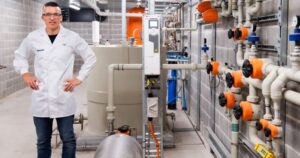Hysata Pty. Ltd. (Wollongong, Australia) has closed what is said to be the largest Series B finding ever in Australia’s clean tech industries, announcing a $111-million USD investment round with strong backing from existing major strategic and financial global investors. This is a significant milestone that demonstrates global recognition for Hysata’s high-efficiency electrolyzer (41.5 kwh/kg incl BoP) with intrinsically low capex and a capital efficient path to mass manufacturing.

Hysata is significantly scaling up its manufacture of electrolyzer stacks (Source: Hysata)
Hysata’s electrolyzers that aim to produce green hydrogen at scale with higher energy efficiency and lower costs than alternative technologies. The company’s technology combines engineering and science in a unique capillary-fed alkaline electrolyser that uses less energy to convert water to hydrogen.
bp Ventures and Templewater led the recent $111.3 million USD investment round in the company, with strong backing from existing major strategic and financial investors IP Group Australia, Kiko Ventures (IP Group plc’s cleantech platform), Virescent Ventures on behalf of Clean Energy Finance Corporation, Hostplus, Vestas Ventures and BlueScopeX.
The company also welcomed new major strategic and financial investors POSCO Holdings, POSCO E&C, IMM Investment Hong Kong, Shinhan Financial Group Co., Twin Towers Ventures, Oman Investment Authority’s VC arm IDO and TelstraSuper.
Hysata will use the funding to expand production capacity at its manufacturing facility in Wollongong, New South Wales and further develop its technology as it focuses on reaching gigawatt scale manufacturing.
Hysata CEO, Paul Barrett, said: “Our mission at Hysata is to accelerate the deep decarbonisation of hard-to-abate sectors such as steel, chemical manufacture, and heavy transport, by delivering the world’s most efficient, simple, and reliable electrolysers. With high-efficiency, intrinsically low capex and a mass-manufacturable design, Hysata aims to drive down the levelised cost of hydrogen.
“This funding round, backed by a world class syndicate of investors, demonstrates the game changing impact Hysata is having on the green hydrogen landscape. It will strengthen our team and enhance our capabilities, as we propel towards widespread commercial availability.
“I am thrilled to have bp Ventures, Templewater and other new investors join ranks with our incredible existing shareholder base. Hysata’s technology is a breakthrough innovation because of its high efficiency and low installed costs. We look forward to working with our shareholders, customers and partners as we continue our scale up journey.”
The International Energy Agency has said that to meet climate ambitions, there is an urgent need to switch hydrogen use in existing applications to low carbon hydrogen and to expand its use to new applications in heavy industry or long-distance transport.[1] At scale, Hysata’s electrolysers could achieve energy efficiency well above International Renewable Energy Agency’s 2050 efficiency target.[2]
Gareth Burns, Vice President of bp Ventures, added: “We know that green hydrogen can play a big role in decarbonisation. This is the first advanced alkaline electrolyser technology that bp Ventures has invested in. It could provide optionality for our hydrogen business as bp aims to become a global leader in low carbon hydrogen production.
“Hysata’s technology could help save energy and reduce production costs, addressing two challenges of the green hydrogen market. We’re excited for Hysata’s next steps.”
Alfred Wong, Partner of Templewater, said: “We are thrilled at Templewater to be driving the green revolution, jointly leading this impactful investment in Hysata. The high efficiency of Hysata’s electrolyser technology holds the potential to be a cornerstone in the worldwide shift to sustainable energy sources. Our investment in Hysata is a testament to Templewater’s commitment to support mission-driven companies that are working towards solving the world’s biggest climate challenges.”
Hydrogen is one of bp’s transition growth engines that it plans to grow by the end of the decade. bp has a number of regional hydrogen energy hubs it is developing, including in Australia, such as H2 Kwinana and the Australian Renewable Energy Hub (AREH).